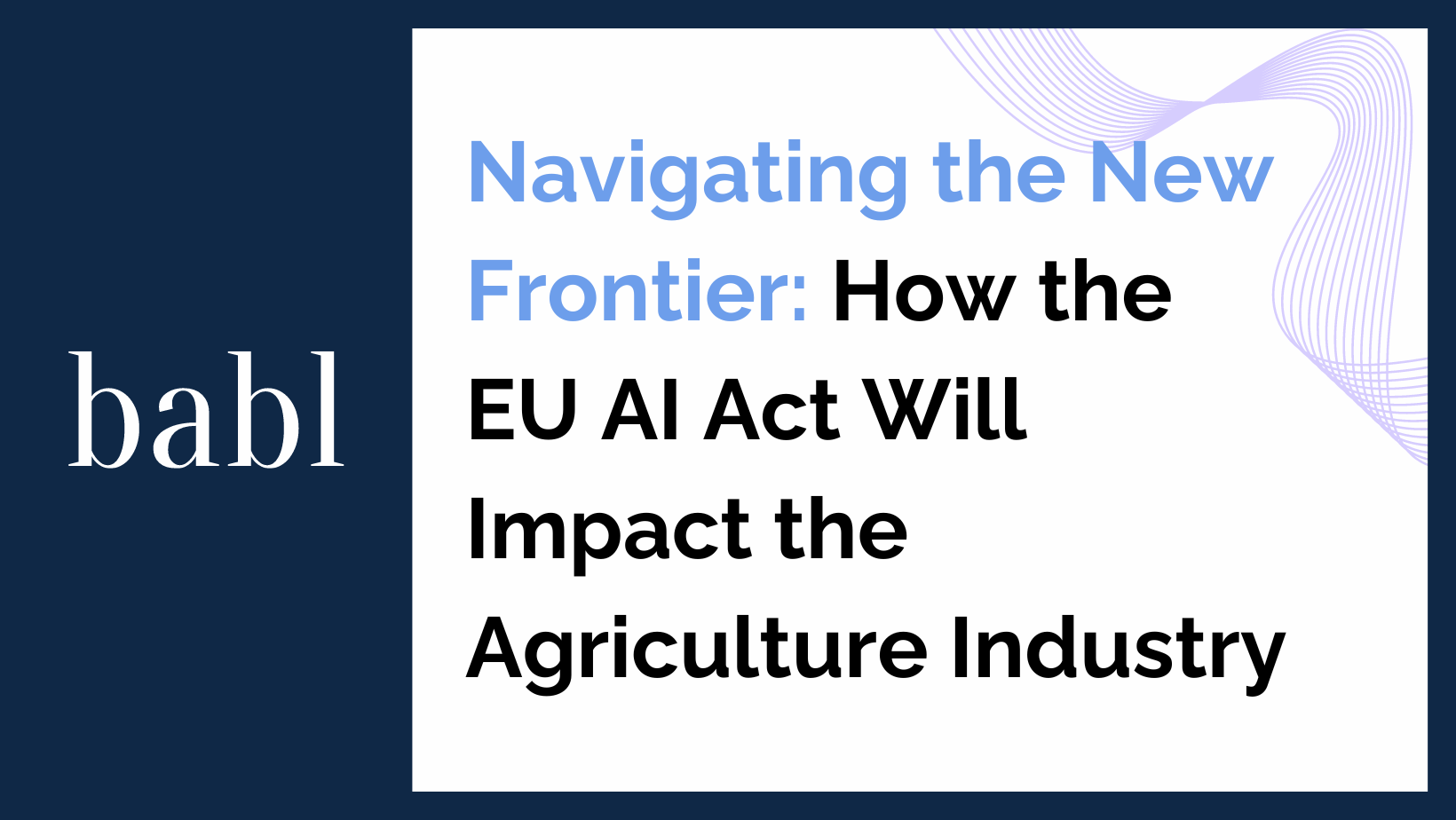The European Union’s Artificial Intelligence Act (EU AI Act) is set to be a transformative piece of legislation, affecting numerous sectors, including agriculture. The integration of AI in agriculture offers promising advancements, such as increased efficiency, improved crop yields, and sustainable farming practices. However, the EU AI Act aims to ensure that these innovations are safe, ethical, and align with the values and regulations of the European Union.
The Promise of AI in Agriculture
AI technologies are revolutionizing agriculture by providing farmers with tools to enhance productivity and sustainability. Key areas where AI is making a significant impact include:
- Precision Farming: AI-powered systems can analyze soil conditions, weather patterns, and crop health to provide precise recommendations for planting, fertilizing, and harvesting. This leads to optimal use of resources and increased crop yields.
- Predictive Analytics: AI can forecast weather conditions, pest infestations, and disease outbreaks, allowing farmers to take preventive measures and minimize crop losses.
- Automated Machinery: Autonomous tractors, drones, and harvesters equipped with AI can perform labor-intensive tasks with high precision and efficiency, reducing the need for manual labor and increasing operational efficiency.
- Supply Chain Optimization: AI helps streamline the supply chain by predicting demand, optimizing logistics, and reducing waste. This ensures that food reaches consumers in a timely and efficient manner.
- Sustainable Practices: AI can promote sustainable farming by optimizing water usage, reducing pesticide application, and enhancing soil health through precise management practices.
The Regulatory Landscape
While the benefits of AI in agriculture are substantial, they come with risks that need to be managed. The EU AI Act establishes a regulatory framework to address these risks and ensure that AI applications are safe, transparent, and ethical.
Key Provisions of the EU AI Act
- Risk-Based Classification: The Act classifies AI systems based on the risk they pose to health, safety, and fundamental rights. High-risk AI systems, which include many agricultural applications, must meet stringent requirements before deployment.
- Transparency and Accountability: The Act mandates transparency in AI operations. Farmers must be informed about the AI systems they use, and developers must maintain detailed documentation to ensure accountability and traceability.
- Data Governance: Given the reliance on data in AI applications, the Act emphasizes robust data governance frameworks. This includes ensuring data quality, privacy, and security to prevent misuse and ensure the integrity of AI systems.
- Human Oversight: The Act requires human oversight for high-risk AI systems, ensuring that final decisions are made by humans. This is crucial in agriculture, where decisions can have significant impacts on food security and environmental sustainability.
- Ethical AI Development: The Act promotes the development of ethical AI systems that adhere to principles of fairness, transparency, and respect for human rights. This includes avoiding biases and ensuring equitable access to AI technologies.
Human Oversight in AI Systems: A Necessary Safeguard
The EU AI Act emphasizes the importance of human oversight, particularly for high-risk AI systems like those used in agriculture. Human involvement remains crucial to ensure that AI systems operate within ethical and safety standards. For instance, even as AI optimizes farming practices and automates processes, the final decision-making authority should rest with humans who can contextualize and understand the broader implications of AI outputs. This requirement is especially important in agriculture, where decisions can directly affect food security, environmental sustainability, and the livelihoods of farming communities. By maintaining human oversight, agricultural businesses can better navigate ethical concerns, build trust among stakeholders, and ensure that AI serves as a tool to enhance, rather than undermine, responsible practices.
Implications for the Agriculture Industry
The EU AI Act will have far-reaching implications for various stakeholders in the agriculture sector, including farmers, AI developers, agribusinesses, and regulatory bodies.
- For Farmers: Compliance will require understanding and explaining how AI tools work, as well as training to use them effectively. While adaptation may take time, farmers will benefit from safer and more reliable AI systems that improve decision-making.
- For AI Developers: Developers face tighter scrutiny. They must perform detailed risk assessments, ensure data integrity, and document system functionality. These requirements may slow innovation, but they also raise the overall quality and trustworthiness of AI solutions.
- For Agribusinesses: Companies using AI in supply chains or production must verify compliance and ensure transparency. By doing so, they can strengthen consumer trust and brand credibility.
- For Regulators: Oversight agencies will create enforcement mechanisms, conduct conformity assessments, and coordinate with industry stakeholders. Their role will be to balance innovation with accountability.
Challenges and Opportunities
The EU AI Act presents both obstacles and benefits for agriculture.
Challenges
- Compliance Costs: Implementing systems that meet EU standards may increase expenses for farmers and developers.
- Slower Innovation:Extra testing and documentation could delay new AI applications.
- Data Privacy: Ensuring proper data management will remain an ongoing challenge.
Opportunities
- Improved Farm Management: Higher-quality, compliant AI systems will boost efficiency and reliability.
- Increased Trust: Transparency rules will strengthen confidence among farmers and consumers.
- Ethical AI Development:Reduced bias and fairer access to AI tools can close productivity gaps.
- Sustainable Farming Practices: Optimized resource use and reduced environmental impact align with Europe’s Green Deal goals.
Looking Ahead
The EU AI Act marks a turning point for agricultural technology. Its framework ensures that AI innovations are not only powerful but also safe, ethical, and sustainable. Although compliance introduces challenges, the long-term benefits—improved decision-making, consumer trust, and environmental stewardship—far outweigh the costs. As Europe’s agriculture sector adapts, collaboration between farmers, regulators, and AI developers will be essential to unlocking AI’s full potential in a responsible and future-ready way.
Need Help?
If you want to have a competitive edge when it comes to the EU AI Act, or any other regulation or law, don’t hesitate to reach out to BABL AI. Their team of Audit Experts can provide valuable insights on implementing AI.





